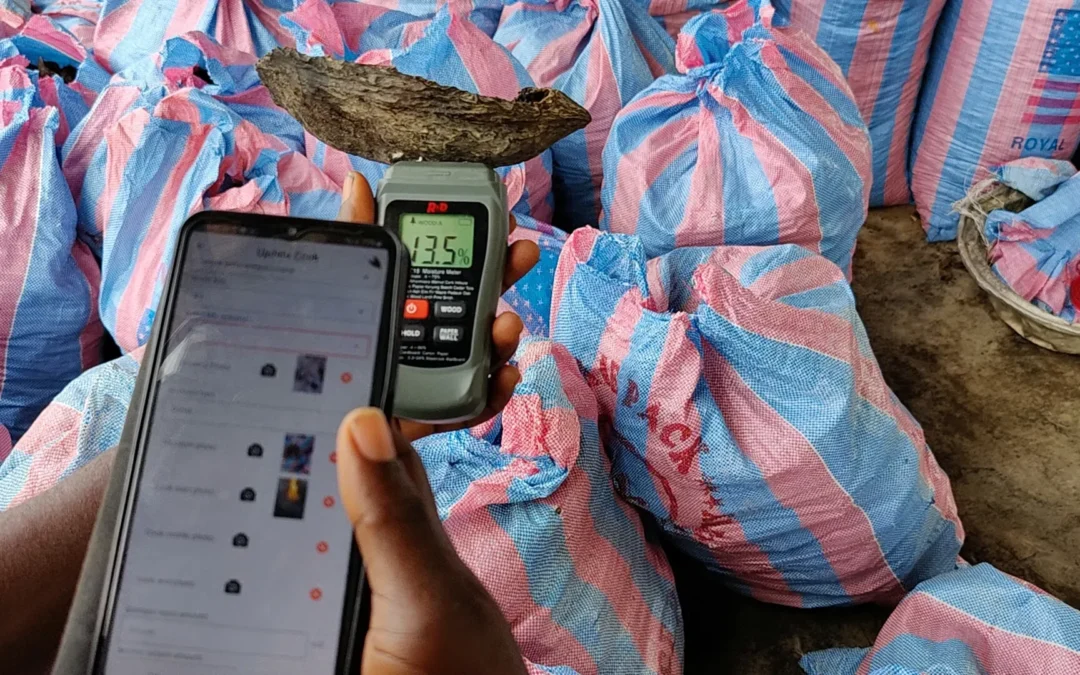This is a piece of our running series of updates directly from our biochar project partners, written from their own experiences and in their own words. Today, we hear from Kekeli and the Tachibana team who are turning cacao pods into biochar in Central Ghana.

April 2025
Kekeli Bright Klu, Internal Inspector, Tachibana:
In recent years, cacao production in Ghana has been declining year by year due to climate change, the spread of pests and diseases, rising fertilizer costs, and soil degradation. In response to this issue, we began exploring whether cacao farmers could increase their yields by carbonizing and utilizing cacao pods, an underutilized biomass readily available to them.
Through this initiative, we realized that the cost of producing biochar was a major challenge to its sustainable production and use, which led us to consider the creation of carbon credits. In 2023, with the support of Japan’s Ministry of Economy, Trade and Industry (METI), we conducted a feasibility study on the production of cacao pod husk biochar and the generation of carbon credits.
Planboo supported us not only as a technical partner for dMRV (digital Monitoring, Reporting, and Verification) but also in building a viable business model. During the pilot, the Tachibana biochar project successfully produced, and generated, biochar carbon removal credits, becoming Ghana’s first C-Sink Manager under the Global Artisan C-Sink Standard.
In May 2024, our first carbon credits—equivalent to 42 t-CO2eq—were successfully certified and sold through Planboo. Following this success, we expanded our operations by adding two more biochar production sites, increasing the number of Kon Tiki kilns to four, and growing the number of production workers to 21.
Following the success of biochar production at our first 3 sites, we’ve been able to onboard a cacao farmers cooperative union, the Assin Tachibana Union, representing 1,700 cacao farmers. This Union project has already passed certification and an external third-party audit, and is set to begin operations in April of this year.
Researching Biochar’s Benefits for Cacao Farming Communities
In August 2023, we registered an NGO called EN FARMERS LBG, with the mission of supporting cacao farmers by improving their productivity and living conditions. To enable more cacao farmers to benefit from soil improvement and increased yields through the use of biochar, we are engaging in discussions with the Japanese government, international organizations, Japanese chocolate manufacturers, and international NGOs to expand our activities more broadly.
As part of this project, we also plan to establish demonstration plots to measure the impact of biochar on cacao production and to develop a biochar application manual for cacao farmers. Since cacao is a perennial tree crop and its response to biochar takes time to manifest, we also plan to create demo plots for vegetables and grains, which show results more quickly, allowing farmers to directly experience the benefits of biochar in the short term.
These field trials will be conducted with the involvement of experts, including a professor specializing in biochar from Japanese university, a professor from Ghana’s Cacao College, and soil scientists with PhDs, to ensure the collection of academically reliable data and the development of practical, science-based manuals.
Through these efforts, we aim to make biochar a familiar and accessible agricultural input for cacao farmers—one that not only improves soil health but also contributes to climate change mitigation. Our goal is to build and scale a sustainable model that benefits both people and the planet.



Looking Ahead
Since it has only been about two years since we began our initiatives in biochar production and carbon credit generation, we continue to face a variety of unexpected challenges on a daily basis. We are constantly working to improve our operations and business model. There is still much we cannot accomplish on our own, and we believe that we would not have been able to continue this biochar initiative without the dedicated support and encouragement of Planboo’s professional team.
The staff at Planboo have been incredibly collaborative, and their dMRV technology continues to evolve and improve, providing us with the confidence and tools we need to generate high-quality carbon credits. We are deeply grateful for the support of the Planboo team.
Fortunately, we are seeing an increase in the number of companies and organizations that share our vision and support our efforts. With their collaboration, we aim to further promote the use of biochar throughout Ghana.
From a rural corner of Ghana, we are striving to contribute to the global fight against climate change through biochar. We hope you will continue to support and encourage our journey.
Best,
Kekeli

